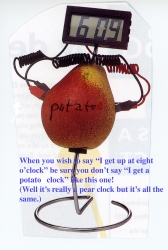"Suggestionisms" – a
"Banned" Lecture
Rhythmic etc distortions of
English
speech and their consequent
involuntary false impressions.
1. During the 1990s for several years I
included among my lectures to
the annual University College London Summer Courses in English
Phonetics a section on what I came to call "Suggestionisms". (A similar
term exists, not usually applied to EFL matters, which has the name
"mondegreens"). These the
audiences as a whole seemed to find stimulating and even quite
entertaining. However, one year there was from what I
imagine to have been a very small element in the audience an adverse
reaction. To these people, it seemed, my remarks on the subject were
perceived as unsympathetically making fun of the weaknesses of EFL
speakers. My attention was drawn to this and thereafter I agreed that
it would be better that I should discontinue including such material. I
have naturally regretted this. What I have just said may be taken as a
caution to those who may feel similarly sensitive about such matters
that they
may not wish to read on.
2. I remain puzzled about those whose reaction was pained especially
because I carefully refrained from including any items that might have
been considered improper or indelicate. For example I made no
reference to the fact that many speakers of languages which have only
voiceless/fortis consonants at word endings (such as
Dutch, German and Polish) may be heard to attempt to say crab sandwiches but are
actually heard as saying crap
sandwiches. Likewise I made no reference
to the fact that some EFL users, in aiming at saying can't, are
actually perceived as uttering what is perhaps the most highly taboo
word in current English by making its vowel so short etc that it rhymes
with British English hunt. I
also made no reference to the probably
apocryphal story told of the EFL student who was said to have
complained to a waitress in Ireland that he had no fork and knife
whereupon he was told that such language would not be tolerated, the
point being that his (General-British-type) pronunciation of fork and
struck the Irish waitress as rhyming with her version of a word like
ducking.
3. The point I had wished to make with my, as I deemed them, completely
inoffensive examples was that when people hear English spoken what is
for them abnormally, they don't simply hear distortions but they often
receive strong suggestions of things quite other than those intended.
This happens at times between fellow native speakers. For example He's
an exporter from speakers of northern English may be perceived
as He's
an ex-porter when heard by southerners. Frequently the
impression
received is of some name. Ada Clarke is the female that British
listeners may seem to hear mentioned by Americans at 8 am or pm. The
number of such impressions is bolstered by the fact that almost
anything can turn out to be an unfamiliar name. Often surnames and even
first names are doubled. Doubled forenames are traditional in the US
South eg Mary-Jo. Such combinations seem fairly recently to be
increasingly revived in the UK (eg Emily-Louise, John Julius).
4. Suggestionistic spellings go back a long way in English. A writer
who used them brilliantly, not only to represent non-mothertongue
English, was the late Kingsley Amis who, eg in his novel I Like it Here
(1958), wrote "Sickies of sickingdom" seemingly to suggest a Portuguese speaker's pronunciation of The Keys of the Kingdom,
though he may well have rather had in mind a French accent. Various examples of this phenomenon are listed below.
5. Words with unstressed final a:
Although there are thousands of words
and names in the English vocabulary which end in unstressed syllables
having the spelling -a, there
is almost only one which can be heard, as
quite a number of people prefer to say it, spoken with /ɑ:/ besides its more usual ending schwa. That
is the word
cinema. (The uncommon word scimitar is another.) EFL speakers, however,
are constantly to be heard as if saying
eg Ah free car or Our freak car, Our merry car or Armoury car, Ay Shah,
and Jam aye car etc. (Africa,
America, Asia and Jamaica.) Compare the
word rush-hour whose pronunciation
coincides exactly with the common EFL distortion
of Russia, a compound word normally
by General British speakers pronounced with
a simple vowel or at least a monosyllable as its latter element, as /`rʌʃɑː/.
Similarly names like
Ella, Emma,
Jessica and Julia may
suggest
different persons from the ones intended eg L. R. FitzGerald, M. R.
Bovary, Jessie Carr-Jones and Julie R. Smith. (Ella FitzGerald, Emma
Bovary, Jessica Jones and Julia
Smith.)
If there is no obvious false
suggestion, words given such final-vowel pronunciations sound either
very pedantic or grossly foreign. Children have fun with such items
posing riddles to each other like, using of course the abnormal
comically pedantic-sounding pronunciation /`dɒgmɑː/, "What is a dogma?"
Answer: "A bitch
with a litter of puppies". (Ma
is a well-known though inelegant abbreviation of Mama ie Mother.)
6. Rhythmic distortions of -ation
words:
Many English
abstract nouns
ending in -ation receive EFL
versions which suggest spellings like the
following in reply to some such question as Did anyone particularly shine in the
examinations?
Our Comma Day shone or Ack-Como Day
shone (accommodation)
Our Judy-Kay shone (adjudication), R. Feelie-Yea shone (affiliation)
Ann I. Hill-Laye shone (annihilation), Anne T . C . Pay shone (anticipation)
Arse-Oce Yea shone or Ass O. C. A. shone (association), Ellie-Min A. shone (elimination)
Coal-Our-Bo Ray shone [cf Coal Arboration] (collaboration)
Cone-Seed Array shone (consideration)
Neggo Shay or Neg O'Shea shone (negotiation)
Detta-Mee Nay shone [cf Debt termination] (determination)
Eggs-Are-Me Nay shone or Ex-Army Neigh shone (examination)
E. Loomie-Neigh shone or Eel-Loo-Mee Nay shone (illumination)
7. Weak syllables made strong:
Dannie L. Jones (Daniel Jones).
Danielle Jones (Daniel Jones)
Steve N. Jones (Steven Jones)
The Passed-On Letters (Paston)
The Family Arrity (familiarity)
The Foul Air Brothers (Fowler)
Lab Oratory or Lab Aura Tory or Labour or Tory (laboratory)
Amen 4 All Seize-Ons (A Man for All Seasons)
Lord Snowed-On (Snowdon)
Walter
Piston was a well-known
American composer
(
pissed is an improper
equivalent of
urinated)
Weedon is the name of many
people and more than one place in the UK.
(wee is a childish indelicate
equivalent of urinate)
Shatton is a
placename (shat is a past form
of the taboo verb shit ie defecate)
8. Greetings, Enquiries etc:
How doo you do (How d'you do)
Gooeda more run Inga (Good morning)
Gooed half dare noon or Goo daft error noon (Good afternoon)
Goodie Venn-Ing (Good evening)
War tease thee tah-eem (What's the time)
Ella Venner-Cloak (Eleven o'clock)
Eat Cévennes Oh Cloak (It's seven o'clock)
9. Failure to employ weakforms, make
pre-fortis reductions etc
Apple Jews (Apple juice)
Orrin Jews (Orange juice)
Ay grew some sight (A gruesome sight)
Butt four thee grey soft God (But for the grace of God)
Ho Ping the optimistic Chinaman (Hoping)
Sea King is the genuine proprietary name of a make of helicopter
(Seeking)
Sea Link is a cross-channel ferry service not the part of a room
above one's head (Ceiling)
Of the King family, Ma and Pa are really no trouble
(Marking is what
teachers do to pupils' work and parking is the driver's stationing of a
vehicle)
but their children may all turn up including
Baby Lee (leaking), Comedian Joe (joking)
Gardener Ray (raking), Counterfeiter Fay (faking)
Creative May (making), Scandinavian cousin Vi (viking)
10. Word tonic misplacement etc:
Perry O'Dickle suggests an Irishman
rather than a publication
(Periodical)
Hair helce has weekend (Her health has weakened)
Eye wheels peak two warn off my co-leagues (I'll speak to one of my
colleagues)
A Meckany Kell or A Mecca-Nickel pro-blame (A mechanical problem)
Sir Cumstance is! or Sir Constance is! (Circumstances)
E-vents weech ockerred re-sent-lee (Events which occurred
recently)
`Back again is not the same thing as back a`gain:
The first means back
once, the second back more than once as in He's been back once and now
he's back again!
I'd like `one may not be the simple reply intended but an insistence
equivalent to "only one".
11. Compounds of any, some and self etc:
He hurt
`heemself or heem
`self. For /hi `hɜt ɪmself/
I want to tell you `some thing.
For /aɪ
wɒnt tə `tel ju sʌmθɪŋ/
Let's ask some `one. For /lets
`ɑːsk sʌmwʌn/
We must ask some `body For /wi məs(t) `ɑːs(k) sʌmbədi/
12. Miscellaneous impressions including
misplaced plosive aspirations
etc
This is a tanker at anchor /ə ˈtӕŋkər ət `ӕŋkə/

Compare /ə ˈtӕŋkər ə `tӕŋkə/a tanker a tanker which may
be what seems to be heard when "A picture of a tanker at anchor" is meant.
I get a potato clock /ˈaɪ ˈget ə pəˈteɪtəʊ `klɒk/ is what some students seem to be saying for I get
up at eight o'clock /ˈaɪ ˈget ᴧp ət ˈeɪt ə`klɒk/ : (in fact small electronic timepieces actually exist which may be
powered by a potato or a pear etc!). This one says 'nine minutes past six':

She ate thee chilled wren's food. (children's)
A beaky pair. Not a couple with large noses but a keeper of bees.
Dev Allotment or Deeve Elopement. (Dev can be short for Devorah, a
variant of Deborah)
development.
In the shed. As from the French singer Maurice Chevalier in the film
Gigi referring to not being
young any more but being happily "in the
shade".
Intonational Airlines may refer not to speech pitches but to flying
into Heece-raw (or East Raw) or Get Weak (Heathrow or Gatwick).
People whose native languages don't contain consonant clusters of
/s/ plus plosive (plus /l/ or /r/) such as Spanish speakers eg may seem
to convert Scotch to S. Kotch, Shakespeare to Sheikh S. B. R.,
Scapegoats to Escaped goats, Seascapes to Sea Escapes, the Strand to D.
S. Trann and even Oxford Street to Oaks Forestry or Oss Forestry.
British children make a playground riddle out of recognising that at
all is generally uttered as a single word as is evident from the
fact
that the aspiration given to its /t/ sound is that appropriate to a /t/
beginning a stressed syllable not one ending an unstressed syllable.
They pose the question "Why is a short negro like a white man?".
The
answer is "Because he's not a tall black" /ˈnɒt əˈtɔːl `blӕk/. Compare not at all black /ˈnɒt ə ˈtɔːl `blӕk/.
13. Some famous people & places:
Jacque's a repair ie Jack the Ripper.
Francine Attrah. Frank Sinatra.
The Foul Air Brozzairs: (The brothers H. W. and F. G. Fowler ).
People may visit Can't Tour Beret Kassy Droll ie Canterbury
Cathedral.
They may see Sheck Spee Awe's Meck Bess: Shakespeare's Macbeth.
Me Seize Setch Ore. Or Miss is Toucher: Mrs Thatcher
Me Store Hah Rolled Mack Me Lann: Mr Harold MacMillan.
Sair Ween-Stone Chewer-a-Cheel: Sir Winston Churchill.
Leave Air a Pool: Liverpool.
E. U. Knee Verrer-Settee Coal-Edge Lonn-Donn: University College
London.
Bore-Key-Nam Pal-Lace: Buckingham Palace.
Less Terror Squerra or Less Stairs Square: Leicester Square.
Peak Addie Ley or Pea Car Delay or Pea Caddie Lee: Piccadilly.
Zee Al-Bearer-Toll: The Albert Hall.
Zee Fess-Tee-Vel-Hole: The Festival Hall.
Zee Shen-Zhing off Cigar: The Changing of the Guard.

